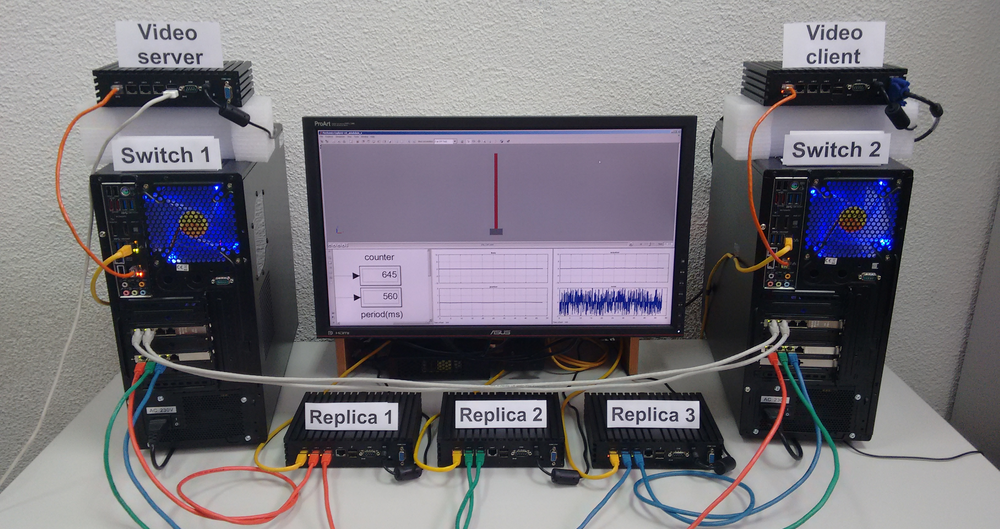FT4FTT — FT4FTT-Ethernet: Fault Tolerance mechanisms for adaptive distributed embedded systems based on FTT-Ethernet
This work is supported in part by the Spanish Science and Innovation Ministry with grant DPI2011-22992, and in part by FEDER funding.
Embedded systems are an ubiquitous technology of strategic importance in modern economics. They play a central role in sectors such civil avionics, automotive, railway signaling, energy distribution and telecommunications; sectors in which Europe has traditionally had a leading position. Embedded systems are typically subject to constraints related to weight, space and energy consumption, and they have to be designed so as to fulfill strict requirements on dependability and real-time performance.
Traditional embedded systems used to be applied in known and fixed environments, which could be predicted in advance. That situation fostered the development of static techniques that guarantee achieving the desired real-time and dependability attributes. Nevertheless, the current tendency is to apply embedded systems also in dynamic environments where the operating conditions may change frequently and in an unpredictable manner. This situation requires development of a novel class of embedded systems, which should be able to automatically adjust its internal strategies in response to changes of the dynamic environment, while keeping the system performance within the desired levels. Such systems are called adaptive embedded systems, and require services supporting flexibility, real-time and dependability at different levels of the system architecture, such as the OS and the network.
FTT-Ethernet is a very promising network technology for developing adaptive distributed embedded systems, as it already provides certain communication services that are very well suited for adaptivity. However, it still lacks the fault tolerance mechanisms that would provide the desired dependability levels. Solving this limitation of FTT-Ethernet would represent a significant step forward in the development of the future adaptive distributed embedded systems, especially due to the remarkable current interest in using Ethernet for embedded systems because of cost considerations.
This research project addresses the design, implementation and validation of a highly-dependable communication infrastructure based on FTT-Ethernet. The aim of our project is stated in three objectives: 1) Achieve an increasing level of dependability for Ethernet infrastructures based on an FTT-Enabled Switch, by means of the incorporation of basic fault tolerance mechanisms; 2) Thoroughly evaluate the correctness of the design as well as the achieved level of dependability; 3) Develop a prototype of said infrastructure in order to obtain experimental results and thus validate the whole infrastructure proposed.
Project Leader
Project Collaborators
-

Guillermo Rodríguez-Navas
Researcher at Nokia Bell Labs
-

Manuel Alejandro Barranco González
-

David Gessner
Freelance and Science Communicator
-

Alberto Ballesteros
-

Sinisa Derasevic
Related Publications
-
A Fault-Tolerant Ethernet for Hard Real-Time Adaptive Systems
IEEE Transactions on Industrial Informatics
-
Study of the Admission Control in the Flexible Time-Triggered and the Audio Video Bridging Communication Protocols
-
Implementation and Testing of the Node Replication Scheme of the FT4FTT Architecture
-
First Implementation and Test of Reintegration Mechanisms for Node Replicas in the FT4FTT Architecture
Proceedings of the 21th IEEE International Conference on Emerging Technologies and Factory Automation (ETFA 2016)
-
Designing fault-diagnosis and reintegration to prevent node redundancy attrition in highly reliable control systems based on FTT-Ethernet
Proceedings of the 12th IEEE World Conference on Factory Communication Systems (WFCS 2016)
-
A First Qualitative Comparison of the Admission Control in FTT-SE, HaRTES and AVB
Proceedings of the 12th IEEE World Conference on Factory Communication Systems (WFCS 2016)
-
First Implementation and Test of a Node Replication Scheme on top of the Flexible Time-Triggered Replicated Star for Ethernet
Proceedings of the 12th IEEE World Conference on Factory Communication Systems (WFCS 2016)
-
FT4FTT final prototype demo
-
Quantitative characterization of the reliability of simplex buses and stars to compare their benefits in fieldbuses
Reliability Engineering & System Safety
-
An OMNET++ model to asses node fault-tolerance mechanisms for FTT-Ethernet DESs
Emerging Technology and Factory Automation (ETFA), 2015 IEEE
-
Towards a Layered Architecture for the Flexible Time-Triggered Replicated Star for Ethernet
Proceedings of the 20th IEEE International Conference on Emerging Technologies and Factory Automation (ETFA 2015)
-
First Experimental Evaluation of the Consistent Replicated Voting in the Hard Real-Time Ethernet Switching architecture
Proceedings of the 20th IEEE International Conference on Emerging Technologies and Factory Automation (ETFA 2015)
-
Experimental Evaluation of Network Component Crashes and Trigger Message Omissions in the Flexible Time-Triggered Replicated Star for Ethernet
Proceedings of the 2015 IEEE World Conference on Factory Communication Systems (WFCS)
-
FT4FTT prototype demo
-
Implementation and Verification of the Slave Elementary Cycle Synchronization Mechanism of the Flexible Time-Triggered Replicated Star for Ethernet
-
Using FTT-Ethernet for the coordinated dispatching of tasks and messages for node replication
Proceedings of the 19th IEEE International Conference on Emerging Technologies and Factory Automation (ETFA 2014), Barcelona, Spain
-
Appropriate consistent replicated voting for increased reliability in a node replication scheme over FTT
Proceedings of the 19th IEEE International Conference on Emerging Technologies and Factory Automation (ETFA 2014), Barcelona, Spain
-
Towards Extending the OMNeT++ INET Framework for Simulating Fault Injection in Ethernet-Based Flexible Time-Triggered Systems
Proceedings of the 19th IEEE International Conference on Emerging Technologies and Factory Automation (ETFA 2014), Barcelona, Spain
-
A Model for Quantifying the Reliability of Highly-Reliable Distributed Systems based on Fieldbus Replicated Buses
Proceedings of the 19th IEEE International Conference on Emerging Technologies and Factory Automation (ETFA 2014)
-
Towards an Experimental Assessment of the Slave Elementary Cycle Synchronization in the Flexible Time-Triggered Replicated Star for Ethernet
Proceedings of the 19th IEEE International Conference on Emerging Technologies and Factory Automation (ETFA 2014), Barcelona, Spain
-
Towards a reliability analysis of the design space for the communication subsystem of FT4FTT
Proceedings of the 19th IEEE International Conference on Emerging Technologies and Factory Automation (ETFA 2014)
-
Achieving Elementary Cycle Synchronization between Masters in the Flexible Time-Triggered Replicated Star for Ethernet
Proceedings of the 19th IEEE International Conference on Emerging Technologies and Factory Automation (ETFA 2014), Barcelona, Spain
-
A Proposal for Managing the Redundancy Provided by the Flexible Time-Triggered Replicated Star for Ethernet
Proceedings of the 10th IEEE International Workshop on Factory Communication Systems (WFCS 2014), Toulouse, France
-
A Proposal for Master Replica Control in the Flexible Time-Triggered Replicated Star for Ethernet
Proceedings of the 10th IEEE International Workshop on Factory Communication Systems (WFCS 2014), Toulouse, France
-
A description of the FTT-SE protocol
-
Towards Preventing Error Propagation in a Real-Time Ethernet Switch
Proceedings of the 18th IEEE International Conference on Emerging Technologies and Factory Automation (ETFA 2013), Cagliari, Italy
-
Implementing a Clock Synchronization Protocol on a Multi-Master Switched Ethernet Network
18th IEEE International Conference on Emerging Technologies and Factory Automation (ETFA13)
-
sfiCAN: a Star-based Physical Fault-Injection Infrastructure for CAN networks
IEEE Transactions on Vehicular Technology
-
Towards a Flexible Time-Triggered Replicated Star for Ethernet
Proceedings of the 18th IEEE International Conference on Emerging Technologies and Factory Automation (ETFA 2013), Cagliari, Italy
-
Towards Dynamic Fault Tolerance on FTT-based Distributed Embedded Systems
Proceedings of the 18th IEEE International Conference on Emerging Technologies and Factory Automation (ETFA 2013), Cagliari, Italy
-
A proposal for Flexible, Real-Time and Consistent Multicast in FTT/HaRTES Switched Ethernet
Proceedings of the 18th IEEE International Conference on Emerging Technologies and Factory Automation (ETFA 2013), Cagliari, Italy
-
Towards efficient probabilistic scheduling guarantees for real-time systems subject to random errors and random bursts of errors
Proceedings of the 25th EUROMICRO Conference on Real-Time Systems (ECRTS'13)
-
Using Timed Automata for Modeling Distributed Systems with Clocks: Challenges and Solutions
IEEE Transactions on Software Engineering
-
Using FTT and stars to simplify node replication in CAN-based systems
Proceedings of the 17th IEEE International Conference on Emerging Technologies and Factory Automation (ETFA 2012), Kraków, Poland
-
A first qualitative evaluation of star replication schemes for FTT-CAN
Proceedings of the 17th IEEE International Conference on Emerging Technologies and Factory Automation (ETFA 2012), Kraków, Poland
-
Node Fault Tolerance for Distributed Embedded Systems based on FTT-Ethernet
-
Adding Fault Tolerance To a Flexible Real-Time Ethernet Network for Embedded Systems
-
Improving Maintenance of FT4FTT: Extending it to Monitor and Log its Available Redundancy via Internet
Proceedings of the 21th IEEE International Conference on Emerging Technologies and Factory Automation (ETFA 2016)
-
Modelado mediante Stochastic Activity Networks (SANs) de la Fiabilidad de un Sistema Distribuido en el que los nodos se comunican a través de una red con Topología de Bus Replicado basada en el protocolo Controller Area Network (CAN)
-
Developments in Flexible Time-Triggered Switched Ethernet
Workshop on Real-Time Ethernet (RATE 2013) in conjunction with RTSS 2013


